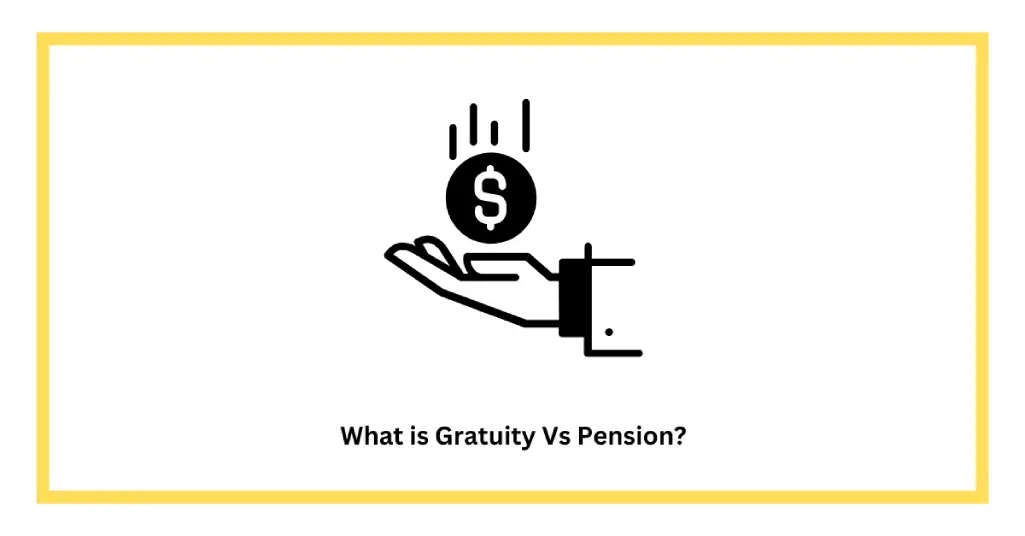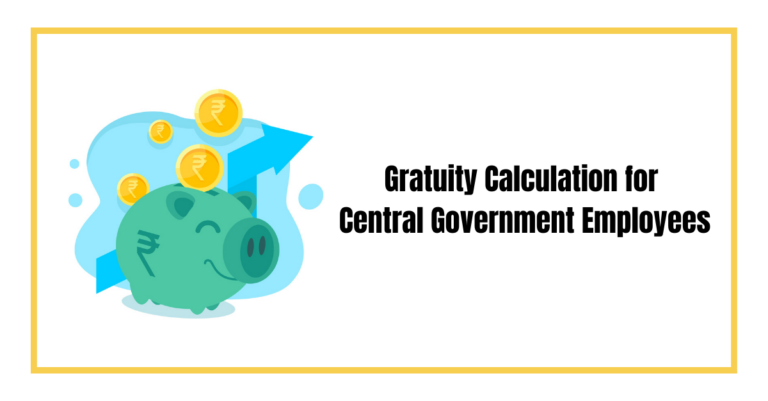Many people compare gratuity Vs Pension and think both are same. But there is a significant difference, which we have pointed out here.
Most workers aspire to secure their retirement, which is contingent on having sufficient financial resources. When an employee reaches a certain age and retires, they may receive a lump sum payment from their employer as a form of appreciation for their tenure. Alternatively, a pension plan may be offered as another retirement benefit, wherein the retiree or their dependents receive a fixed monthly sum for the duration of their life. Know more about Gratuity and Pension
Government programs like pensions and gratuities ensure that retired or departing salaried workers can continue to live in comfort. Look at the article because it tries to explain the distinctions between Gratuity and Pension.
Retirement Versus Gratuity
Pension is paid out at the end of an employee’s employment, whereas Gratuity is paid out at the end of their service. The gift could be made in a single lump sum or spread over several months. In contrast, Gratuity is a one-time payment made to a departing employee as a token of appreciation for their time and effort while employed. Typically, a pension is awarded to a former government worker or an employee of a government-run company or agency. After a certain number of years of service, eligible employees will begin receiving pension benefits. The majority of the time, the amount given is predetermined every month.
Gratuity Meaning
A member or worker is entitled to a gratuity from their corporation as recognition for the value added by the member or worker to the corporation in the form of wages. As one of the many retirement benefits offered by the company to the employee upon their departure from the company and their position, Gratuity is a well-defined perk.
An employee may resign for various reasons, including dissatisfaction with his position, a better opportunity elsewhere, physical or mental limitations, or retirement. Employees who have worked for the company full-time for five years or more are entitled to a termination bonus.
A business can pay for a set or group retirement plan out of its funds or use the services of a life insurance company. If the firm opts for a life guarantor or insurer, it will be required to make annual contributions to the insurer in the amounts specified by the guarantor or insurer.
The employee is also free to contribute to his gratuity account or fund. The insurance company will pay out the bonus based on the specifics of the group or combined bonus structure. Workers must report their adopted Gratuity as income under the salary heading. Gratuity, in this case, is considered ‘earnings from different origins and, therefore, not subject to taxation by the worker’s legal heirs or successors.
What is ‘Pension’?
While many companies offer pensions as part of their retirement packages, this is not universal. Many large corporations and governments also provide pensions for their employees. If your company offers a pension plan or proposal, it will contribute money to your pension plan. When you reach a certain age or retirement phase, the company is required to pay you a lump sum as a part of your severance package. An annuity formula considers your age, the time you’ve worked for the company offering the pension, and the amount you’ve worked there.
The Labor Department has established clear guidelines to which all pension plans must adhere. These policies spell out how much money, in terms of both time and money, the company must set aside each year to have a reserve fund large enough to provide a defined retirement or pension benefit in the future.
The majority of pension earnings and benefits are taxable. If you expect to owe taxes on your pension reimbursements, you must explain this when you start receiving them. It’s possible that a certain amount of money contributed to a pension plan will be exempt from taxes. A pension does not guarantee that an employee will not be fired or laid off. When this happens, the money you’ve earned freezes. Poorly executed pension policies have left some people without the promised or guaranteed benefits.
Distinctive Features of Gratuity and Pension
These distinctions help define the scope of Gratuity and Pension, respectively:
- A gratuity is an employer-provided retirement benefit that goes above and beyond the minimum required by law. On the other hand, the pension can be understood as a form of investment through which an employer invests a sum certain to guarantee periodic payments of that sum to a retired worker or the worker’s dependents in the event of their death.
- A gratuity is nothing more than a token of appreciation from an employer to an employee for the latter’s work. Instead, the pension is a retirement plan where the employer invests a set amount in guaranteeing payment to the employee upon retirement.
- The employer pays the entire Gratuity amount in one lump sum. Contrast this with a pension, where the retiree receives a set amount based on their worked years.
- At least ten years of qualifying service are needed to qualify for a pension. On the other hand, a minimum of five years of service is required before an employee is eligible for Gratuity.
- While Gratuity is paid out all at once, pension is paid out monthly.
- The Employees’ Pension (Amendment) Scheme, 2017 (also known as the Employees’ Pension Scheme, 1955) governs pension benefits for workers as of April 6, 2017. The Payment of Gratuity Act of 1972 regulates the distribution of gratuities.
Conclusion
When an employee’s employment ends, whether through retirement or superannuation, the employer typically provides two forms of compensation known as “gratuity” and “pension” to cushion the blow of a sudden loss of salary. It guarantees much-needed financial support to the family even after the employee’s death. Pension and gratuity payments vary from one member to the next based on salary and length of service. If you want to know more about Gratuity and pension, get in touch with Vakilsearch experts who have been in this industry for years.
FAQs on Gratuity and Pension
Is Gratuity paid as a lump sum, and how does it differ from the periodic payments of Pension?
Gratuity is typically paid as a lump sum upon retirement, while Pension involves periodic payments. Gratuity serves as a one-time payment based on service tenure, while Pension provides a regular income stream, often linked to the employee's salary and years of service.
What are the eligibility criteria for employees to receive Gratuity?
To be eligible for Gratuity, an employee must have completed a minimum of five years of continuous service with the same employer. It is payable upon retirement, resignation, or death, with specific eligibility criteria governed by labour laws.
Can an employee receive both Gratuity and Pension, or are they mutually exclusive?
Employees can receive both Gratuity and Pension. They serve different purposes—Gratuity as a lump sum based on tenure, and Pension as a periodic income linked to salary and service duration. They are not mutually exclusive and are often part of a comprehensive retirement benefit plan.
How does the tax treatment differ for Gratuity and Pension earnings?
The tax treatment for Gratuity and Pension differs. Gratuity is exempt up to a certain limit based on years of service, while Pension is taxable as regular income. Employees may explore tax-saving options like the standard deduction and exemptions available under the Income Tax Act.
Are there any specific regulations governing Gratuity and Pension schemes, and how do they impact employees?
Yes, both Gratuity and Pension schemes are governed by specific regulations. These regulations define eligibility criteria, payment structures, and tax implications. Understanding these rules is crucial for employees to maximise their benefits and ensure compliance with legal requirements.
In case of termination or resignation, what are the conditions under which an employee is entitled to Gratuity or Pension?
In the case of termination or resignation, an employee is entitled to Gratuity if they have completed five years of continuous service. Pension eligibility may vary, but typically, a minimum service period is required. Understanding these conditions is essential for employees planning their career transitions.
How does the length of service requirement vary for Gratuity (5 years) and Pension (10 years)?
The length of service requirement differs for Gratuity and Pension. Gratuity is payable after five years of continuous service, while Pension often requires a minimum of ten years. This distinction emphasises the long-term commitment needed for a pension benefit.
Can employees contribute to their Gratuity fund, and how does it affect the taxation of Gratuity earnings?
Employees generally do not contribute to their Gratuity fund; it is an employer-funded benefit. The taxation of Gratuity is influenced by factors like years of service, with exemptions available up to a specified limit. Understanding these nuances helps employees make informed financial decisions.
For employees planning their retirement, what advice or considerations are crucial when opting for Gratuity or Pension?
Employees planning retirement should consider factors such as financial goals, lifestyle, and family needs when choosing between Gratuity and Pension. Consulting a financial advisor is essential to assess individual circumstances and make informed decisions aligned with long-term financial objectives.
Are there any circumstances under which Gratuity or Pension benefits can be forfeited or reduced?
Gratuity or Pension benefits may be forfeited or reduced under certain circumstances, such as termination due to misconduct or resignation before completing the required service period. Understanding the terms and conditions of employment is crucial to avoiding any potential loss of benefits.










